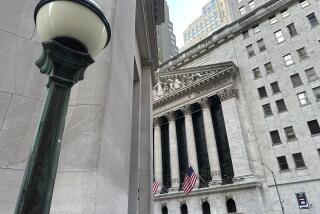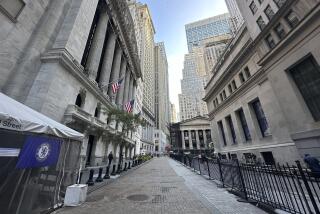Most of Wall Street slips as expectations rise for rates to stay high

- Share via
NEW YORK — Most U.S. stocks slipped Tuesday, and Treasury yields rose on expectations that interest rates may stay high for a while.
The Standard & Poor’s 500 fell 10.41 points, or 0.2%, to 5,051.41. The index deepened its loss from the day before, when it sank under the pressure brought by a jump in Treasury yields. The Dow Jones industrial average rose 63.86 points, or 0.2%, to 37,798.97, and the Nasdaq composite fell 19.77 points, or 0.1%, to 15,865.25.
A 5.2% climb for UnitedHealth helped support the market after the insurer reported stronger results for the first three months of the year than analysts expected. Morgan Stanley was another winner, rising 2.5%, after likewise topping expectations.
But the majority of stocks fell as Treasury yields rose after comments by Federal Reserve Chair Jerome H. Powell. They’ve been climbing rapidly as traders give up hopes that the Fed will deliver many cuts to interest rates this year. High rates hurt prices for all kinds of investments and raise the risk of a recession in the future.
Powell said at an event Tuesday that the central bank has been waiting to cut its main interest rate, which is at its highest level since 2001, because it first needs more confidence that inflation is heading sustainably down to its 2% target.
“The recent data have clearly not given us greater confidence and instead indicate that it’s likely to take longer than expected to achieve that confidence,” he said, referring to a string of reports this year that showed inflation remaining hotter than forecast.
He suggested that if higher inflation does persist, the Fed will hold rates steady “for as long as needed.” But he also acknowledged that the Fed could cut rates if the job market unexpectedly weakens.
Treasury yields climbed immediately after Powell’s comments. They had already been higher after the Fed’s vice chair made similar comments earlier in the day.
Philip Jefferson said his expectation is for inflation to keep easing and for the Fed to hold its main rate “steady at its current level.” That contrasted with his remarks in February, when he said “it will likely be appropriate to begin dialing back policy restraint at some point this year” if things went as he expected.
The yield on the two-year Treasury, which tracks expectations for Fed action, shot as high as 5% immediately after Powell spoke and got back to where it was in November.
But yields later pared their gains as the afternoon progressed, and the two-year yield drifted back to 4.98%. That’s still up from 4.91% late Monday.
Traders are mostly betting on the Fed delivering just one or two cuts to interest rates this year after coming into 2024 expecting six or more. They’re now also betting on a 12.5% probability that no cuts are coming, up from just 1.2% a month ago, according to data from CME Group.
The threat of rates staying high for longer hit real-estate investment trusts and utility stocks particularly hard. They pay relatively high dividends and tend to attract the same kind of investors as bonds do. When bonds are paying higher yields, income-seeking investors may camp there instead.
Real estate stocks fell 1.5% for the largest loss among the 11 sectors that make up the S&P 500. Utilities weren’t far behind with a loss of 1.4%.
High rates can also translate into more expensive mortgages, and stocks of home builders slumped after a report showed they broadly broke ground on fewer sites last month than economists expected. Lennar fell 2.3%, and D.R. Horton sank 2%.
Northern Trust slumped 5% after the financial services company reported weaker earnings for the start of the year than analysts expected. Johnson & Johnson sank 2.1% despite topping profit forecasts. Its revenue came in shortly below expectations.
Companies are under even more pressure than usual to report fatter profits and revenue because the other lever that sets stock prices, interest rates, looks unlikely to add much lift soon.
The stock of Donald Trump’s social media company also slumped again. Trump Media & Technology Group fell 14.2% to follow up on its 18.3% slide from Monday.
The company said it’s rolling out a service to stream live TV on its Truth Social app, including news networks and “other content that has been cancelled, is at risk of cancellation, or is being suppressed on other platforms and services.”
The stock has dropped below $23 after nearing $80 last month as euphoria fades around the stock and the company made moves to clear the way for some investors to sell shares.
In markets abroad, stock indexes tumbled across Asia and Europe as they caught up with the drubbing Wall Street took Monday. Stock indexes fell 2.1% in Hong Kong, 2.3% in Seoul and 1.8% in London.
Choe writes for the Associated Press. AP Business Writers Matt Ott and Elaine Kurtenbach contributed to this report.
More to Read
Inside the business of entertainment
The Wide Shot brings you news, analysis and insights on everything from streaming wars to production — and what it all means for the future.
You may occasionally receive promotional content from the Los Angeles Times.










